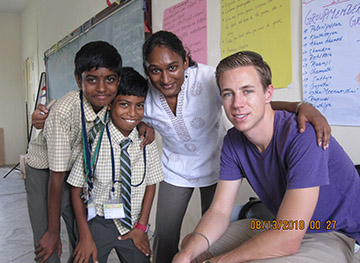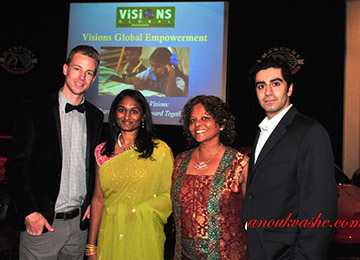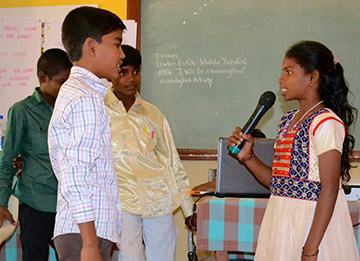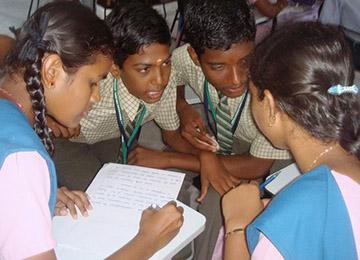
By PREM SOURI KISHORE
LANCASTER, CA - The year was 2003. Meera Pathmarajah, with a roster of degrees from Berkelely, Harvard and Columbia University set off to Batticola, Sri Lanka with a team of volunteers to seek out young girls and boys-survivors . These are the victims of violent conflict that had riven the island nation,
LANCASTER, CA - The year was 2003. Meera Pathmarajah, with a roster of degrees from Berkelely, Harvard and Columbia University set off to Batticola, Sri Lanka with a team of volunteers to seek out young girls and boys-survivors . These are the victims of violent conflict that had riven the island nation,
the tsunami, and natural disasters Youth who had seen the ravages of war, orphaned, who lived in cramped shelters, a prey to disease, malnutrition, and lack of education. Meera wanted to invest in them. To build a better future, rebuild their lives in a no conflict environment and help them to realize and unleash their potential. A Youth Leadership Program-Visions Global Empowerment took root. A conscious strategy and approach towards responsibility, self reliance and dignity.
Training camps were used to develop personal and life skills, encourage creativity and analytical thinking, awareness of human rights, and help the children to organize Leadership Committees in their schools and communities.
Over the next few years another centre was set up in Tiruvanamalai in Tamil Nadu and now a Deaf Center in Ethiopia is the new project assisting the disadvantaged and providing opportunities for those who lacked facilities for learning. The goal was to let the youth never feel alone and have the tools and resources to accomplish their goals.
Twelve years later, she looks back with the same fire, energy and enthusiasm at the programs which gave strength , hope and a vision.
Did you come to the US because of political conflict in Sri Lanka?
No. In the sixties ,there were discrimination policies that made it difficult for Tamils to get into universities in Sri Lanka. My mother’s family had settled abroad in the UK, Canada and the US. One of the uncles sponsored us. My father , who wanted to study medicine was fortunate to come to the US and I was born in Lancaster, California. About 30 or 40 families from Sri Lanka were living there and we formed a small community.
Looking back, did you ever imagine that Visions would bring young people into the forefront of change?
I had no idea we would come so far. We celebrated our 10th anniversary in 2013. As a child I never visited Sri Lanka .In 2002, I did go there and discovered that there were distressing stories everywhere. During the conflict ,many were sent to children’s homes throughout the nineties. When I spoke to refugees, and orphans and tried to understand what they had gone through, it was a heart wrenching experience to hear mothers talking about the children living in a hole in the ground, the lack of camp facilities, with rain pouring down , 30 0r 40 malnourished kids living in a tiny cramped space. A living hell with children being abducted on their way to school. Every family in north eastern Sri Lanka has been affected. People have lost members of the family, either in the war or natural disasters. Fear was everywhere. An everyday reality.
Then the camps started shutting down due to scarcity of funds. So here I am looking at 300 children in one region not getting the care a child deserves. That moved me .It was an instant bond. When I came back , I realized that all the children had the same aspirations like us. Get an education, a job, but they lacked opportunity.
Were you motivated by any other urge to bring about change?
In 2003, I channeled my own experiences into the youth leadership program. For 10 summers I had been attending workshops organized by the Dance gurus from Chennai, the husband and wife team-Dhananjayans. I was exposed to role modelling in that environment. I applied the same concept in my training camps in Sri Lanka. On my first visit I took with me nine volunteers .We lived in the same facilities as the children, ate the same food, and connected deeply. In 2004 the tsunami happened. We got a lot of support and in 2007 we took 27 volunteers with us ! Visions has spiraled , every year we keep growing.
What is a typical day in a camp?
I devise a camp curriculum with yoga, several hours of English ,leadership lessons, lunch, rest, sports, dance time and more. The 2 week program is transformative . The presence of volunteers allows young people to dream again.
We have also partnered with local organizations in the countries where we work There are summer camps. We support programs after school, offer grants and scholarships, work with teachers, provide learning materials.
We have started larger projects like setting up a computer lab, donating band instruments . Another large scale project is coming up-a boarding school in India .
What is the criteria for selecting children to attend camps?
It varies in each country. We partner with local projects in north eastern Sri Lanka. In every village we work with 10th or 11th grade students and there are only a handful in remote areas. .We reach out to them. More difficult to get boys to attend. Boys try to get a job and pursue another path. Most of them walk 3 km to reach a school. We have a tutoring program and have reached at least a thousand students. In India it is on a different scale .It is near Tirunamalai in Tamil Nadu. There are 105 villages which sponsor Parliamentary program. Their leaders attend the program .
What is the work you are doing in Ethiopia and Tamil Nadu?
There is scarce attention given to those with hearing loss. We are putting our heart and soul into this new venture. We are working with the needs of rural people. There is no attention given to them. Deaf children if they do go to school are sitting in regular classes, unable to comprehend anything. We have identified 2 schools and hired teachers who can help the deaf. We also run the Leadership program and give some small grants and try to set them up for business .We are trying to give purpose to the lives of the deaf and we strive to get them jo bs Bahirbar , a few miles from Addis Ababa.
In Tamil Nadu we are partnering with an existing organization which already has a Children’s Parliamentary program.
Have there been any problems with the local government?
We have never faced any problem in India or Ethiopia as our partners are registered with the Government. In Sri Lanka the former Government was hostile but one of our partners is associated with a church program and it is less tricky now. Things have shifted significantly after the end of the war. Lot more open access.
Tell me about the film you produced and have screened in Los Angeles this week.
We have produced a fifteen minute short compelling film highlighting the struggles and aspirations of young people in 3 countries. From a specific region, we selected a few young people to talk of the Visions programs and how it has impacted them . It is part of our film campaign.
Today the mood is one of relief.The experience of every day war is no longer there. A change in the political climate is reassuring. But it is a major struggle to find jobs and cope with everything that has happened. A lot of anxiety, limited infrastructure,. There may be lot of projects catering to tourism but there is a lot of uncertainity of the likelihood of getting a job.
(Pathmarajah is now an Adjunct Professor at the University of San Francisco teaching globalization and gender and international perspectives on education. She is the CEO and Founder Board of Directors of Visions.)
Training camps were used to develop personal and life skills, encourage creativity and analytical thinking, awareness of human rights, and help the children to organize Leadership Committees in their schools and communities.
Over the next few years another centre was set up in Tiruvanamalai in Tamil Nadu and now a Deaf Center in Ethiopia is the new project assisting the disadvantaged and providing opportunities for those who lacked facilities for learning. The goal was to let the youth never feel alone and have the tools and resources to accomplish their goals.
Twelve years later, she looks back with the same fire, energy and enthusiasm at the programs which gave strength , hope and a vision.
Did you come to the US because of political conflict in Sri Lanka?
No. In the sixties ,there were discrimination policies that made it difficult for Tamils to get into universities in Sri Lanka. My mother’s family had settled abroad in the UK, Canada and the US. One of the uncles sponsored us. My father , who wanted to study medicine was fortunate to come to the US and I was born in Lancaster, California. About 30 or 40 families from Sri Lanka were living there and we formed a small community.
Looking back, did you ever imagine that Visions would bring young people into the forefront of change?
I had no idea we would come so far. We celebrated our 10th anniversary in 2013. As a child I never visited Sri Lanka .In 2002, I did go there and discovered that there were distressing stories everywhere. During the conflict ,many were sent to children’s homes throughout the nineties. When I spoke to refugees, and orphans and tried to understand what they had gone through, it was a heart wrenching experience to hear mothers talking about the children living in a hole in the ground, the lack of camp facilities, with rain pouring down , 30 0r 40 malnourished kids living in a tiny cramped space. A living hell with children being abducted on their way to school. Every family in north eastern Sri Lanka has been affected. People have lost members of the family, either in the war or natural disasters. Fear was everywhere. An everyday reality.
Then the camps started shutting down due to scarcity of funds. So here I am looking at 300 children in one region not getting the care a child deserves. That moved me .It was an instant bond. When I came back , I realized that all the children had the same aspirations like us. Get an education, a job, but they lacked opportunity.
Were you motivated by any other urge to bring about change?
In 2003, I channeled my own experiences into the youth leadership program. For 10 summers I had been attending workshops organized by the Dance gurus from Chennai, the husband and wife team-Dhananjayans. I was exposed to role modelling in that environment. I applied the same concept in my training camps in Sri Lanka. On my first visit I took with me nine volunteers .We lived in the same facilities as the children, ate the same food, and connected deeply. In 2004 the tsunami happened. We got a lot of support and in 2007 we took 27 volunteers with us ! Visions has spiraled , every year we keep growing.
What is a typical day in a camp?
I devise a camp curriculum with yoga, several hours of English ,leadership lessons, lunch, rest, sports, dance time and more. The 2 week program is transformative . The presence of volunteers allows young people to dream again.
We have also partnered with local organizations in the countries where we work There are summer camps. We support programs after school, offer grants and scholarships, work with teachers, provide learning materials.
We have started larger projects like setting up a computer lab, donating band instruments . Another large scale project is coming up-a boarding school in India .
What is the criteria for selecting children to attend camps?
It varies in each country. We partner with local projects in north eastern Sri Lanka. In every village we work with 10th or 11th grade students and there are only a handful in remote areas. .We reach out to them. More difficult to get boys to attend. Boys try to get a job and pursue another path. Most of them walk 3 km to reach a school. We have a tutoring program and have reached at least a thousand students. In India it is on a different scale .It is near Tirunamalai in Tamil Nadu. There are 105 villages which sponsor Parliamentary program. Their leaders attend the program .
What is the work you are doing in Ethiopia and Tamil Nadu?
There is scarce attention given to those with hearing loss. We are putting our heart and soul into this new venture. We are working with the needs of rural people. There is no attention given to them. Deaf children if they do go to school are sitting in regular classes, unable to comprehend anything. We have identified 2 schools and hired teachers who can help the deaf. We also run the Leadership program and give some small grants and try to set them up for business .We are trying to give purpose to the lives of the deaf and we strive to get them jo bs Bahirbar , a few miles from Addis Ababa.
In Tamil Nadu we are partnering with an existing organization which already has a Children’s Parliamentary program.
Have there been any problems with the local government?
We have never faced any problem in India or Ethiopia as our partners are registered with the Government. In Sri Lanka the former Government was hostile but one of our partners is associated with a church program and it is less tricky now. Things have shifted significantly after the end of the war. Lot more open access.
Tell me about the film you produced and have screened in Los Angeles this week.
We have produced a fifteen minute short compelling film highlighting the struggles and aspirations of young people in 3 countries. From a specific region, we selected a few young people to talk of the Visions programs and how it has impacted them . It is part of our film campaign.
Today the mood is one of relief.The experience of every day war is no longer there. A change in the political climate is reassuring. But it is a major struggle to find jobs and cope with everything that has happened. A lot of anxiety, limited infrastructure,. There may be lot of projects catering to tourism but there is a lot of uncertainity of the likelihood of getting a job.
(Pathmarajah is now an Adjunct Professor at the University of San Francisco teaching globalization and gender and international perspectives on education. She is the CEO and Founder Board of Directors of Visions.)





 RSS Feed
RSS Feed
